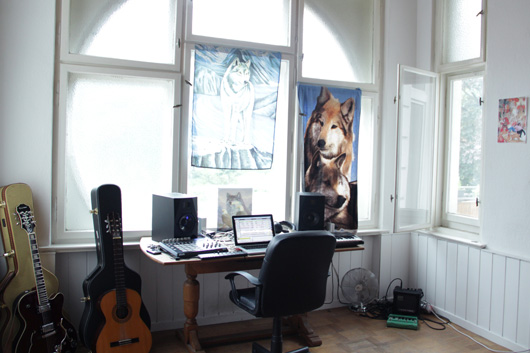In the Studio: Machinedrum
Travis Stewart is one busy dude. In recent years, it’s hard to think of another […]
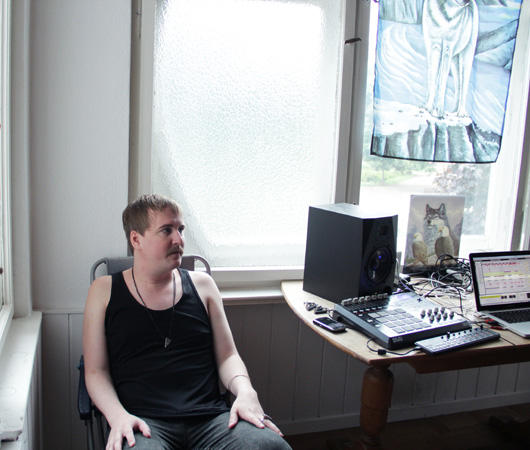
Travis Stewart is one busy dude. In recent years, it’s hard to think of another artist within the bass-music sphere who’s put out more releases, a feat made all the more impressive by the fact that Stewart also maintains a rigorous tour schedule that keeps him constantly hopping around the globe. Operating solo as Machinedrum and working as one half of Sepalcure (with partner Praveen Sharma), the American-born producer resides in Berlin and does much of his music making in a bedroom studio located in the city’s Kreuzberg district. Curious about his current production methods and how they’ve evolved over the years, we paid Stewart a visit earlier this summer, and somehow got him talking about the essential role that Weezer played in his musical coming of age.
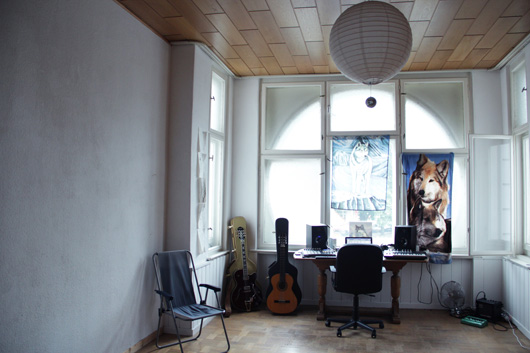
XLR8R: When did you start producing?
Machinedrum: I was making electronic music when I was 12, 13. I didn’t even really know what producing was. I used mainly software, but I also played guitar and had some keyboards, almost exactly what I have now. But the software was very different, it was very old school, like Cakewalk and Impulse Tracker.
You mentioned playing guitar. Were you in bands?
Yeah. I grew up in a really small town in North Carolina, so a lot of the musicians that I was friends with weren’t necessarily into the same music that was into. I was getting really heavy into electronic music, and probably the most electronic music that my friends knew about was maybe Fatboy Slim, Chemical Brothers, Daft Punk, or something like that, which was fine, but I was really interested in making [that kind of music]. This is my roundabout way of telling you that I was in a Weezer cover band. [laughs] We covered Weezer, Smashing Pumpkins, Hum…
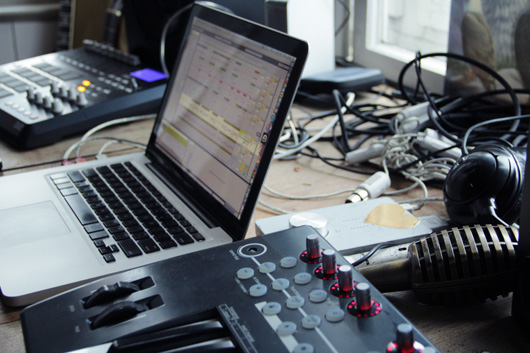
Were you recording any of that stuff?
No, we had some videotaped performances. We’d get to these points where I was like, “Guys, let’s try to write some songs,” and we would start to, it would be fun. I think we played some of them out, but everyone got really frustrated and it was like, “Let’s just stick to covers.” But I was also in the jazz band in high school. They already had a guitarist when I joined, so they needed a bassist. I had never really played bass before—my brother had. So I decided, “Why not?” and I ended up playing bass throughout high school, all four years. I was also playing marching snare in the marching band. I was in African ensemble, the community percussion ensemble that was based out of Lenoir-Rhyne college in Hickory, North Carolina. I was involved in a lot of different stuff, but not necessarily what I wanted to do. It was just whatever I could get.
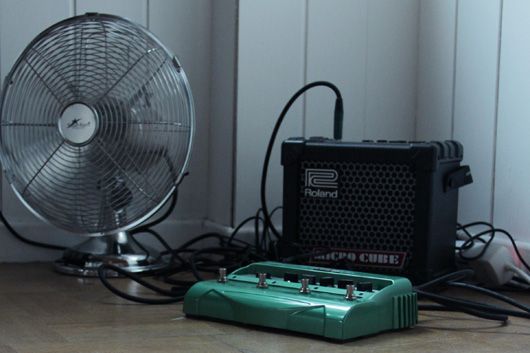
Going back to your electronic-music production, you mentioned that you started with Cakewalk and Impulse Tracker. How has that evolved over the years?
The biggest part of the evolution has been the process and the understanding of how to get ideas out of my head. For the longest time, maybe 11 or 12 years, I only used Impulse Tracker, which is just a sample-based sequencer. It’s very limiting, but I kind of liked that. It was very hard to move on to other programs like Logic, because I felt like there were too many options in that kind of software. I think using Impulse Tracker for so long and just basically having everything primarily be sample based, which required me to build up a huge sample library and always be recording stuff—recording any sounds I heard, like field recordings, guitar, my friend’s synths, singing or whatever. I still work off that same sample library. I’ve been building it for ages now, I don’t even want to say how long. I use that same approach now with Ableton, which I’ve been using primarily for the past four years for production. I go into making songs, or starting a track, by going through my sample library and finding something interesting that inspires me.
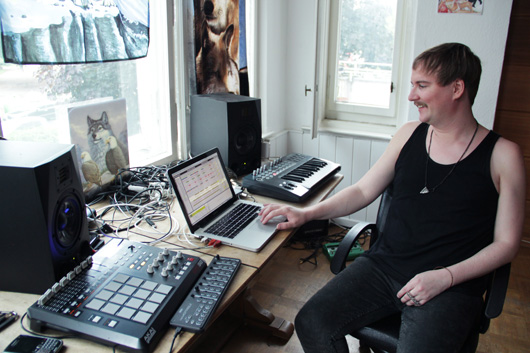
Do you tend to start with a loop or beats or melodies? Do you have a set songwriting process?
It all depends on the mood. Sometimes I’m just feeling like making some ambient sort of song, so I’ll find field recordings and start adding little melodic things over that. Suddenly, I’ll start adding some pulsey bass or something. Eventually, I’ll say, “Now this needs a beat,” and I’ve totally gone way left of that ambient sort of direction. Other times, I’ll find some funny, ghettotech-sounding vocal sample and loop that over and over and throw a beat over it. It’s always changing, it just depends on the mood.
You definitely put out a lot of material. Are you a really fast producer?
I’ve become a lot faster in the past few years. I think a lot of it has to do with the discovery of the idea of externalizing the idea of genius—which I think anybody can really tap into—externalizing this creativity. Like, rather than putting pressure on myself to think that I have to pull out these ideas, all I feel like I’m responsible for is practicing and learning about my craft as much as possible so that when the ideas come—from wherever they come from; a lot of times, I have no idea what’s happening when I’m writing a song—I’m able to at least understand the idea and translate it into a track.
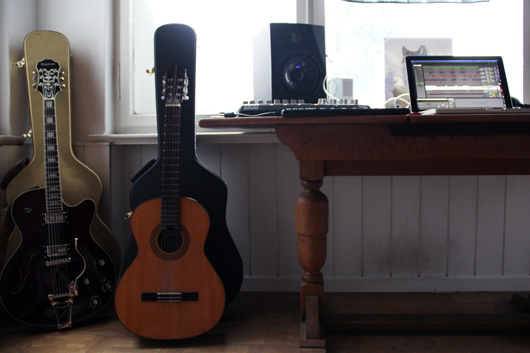
When you talk about learning your craft, are you referring to learning shortcuts in Ableton or making plugins?
It has to do with that, [but it’s also] collaborating with other people. A lot of times, you’ll learn so much, just through their own process using the same software. The beautiful thing about Ableton is that I feel like every single person that uses it has a different sort of approach. None of them are wrong, they’re all just unique. So, I’ve learned from that, and yeah, it’s exactly what you said, [learning] little shortcuts, different tricks. But also, learning tutorials, or even just studying music in general and the history of music—how a certain sound has gotten to this point, and who the originators are.
When you’re writing your music, sequencing and stuff, are you using MIDI controllers, the keyboard, or both?
With all the traveling I’ve been doing the past couple of years, I’ve gotten really into just having my laptop, record arming a track, and tapping a beat on the computer keyboard. Even in Impulse Tracker, that was how you inputted a lot of the notes. I’ll find myself doing that, even if I’ve got my MIDI keyboard sitting right next to me. I switch it up a bit though.
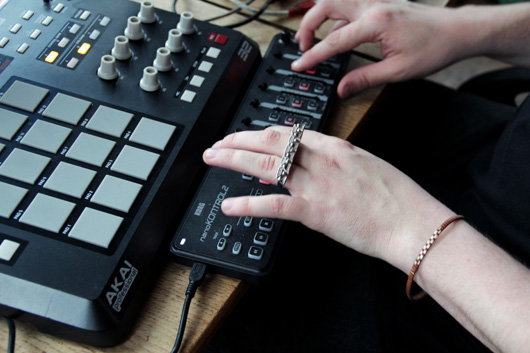
Looking at your setup, are the guitars the only items that aren’t digital?
Yeah, although I use microphones to record my voice, or tapping on the table, any sort of weird Foley sounds, stuff like that.
You have another project, Tstewart. Is that more of a band?
It’s a folk rocky, but also synth poppy sort of thing. It’s very lo-fi, shoegazey… sort of going back to a lot of my ’90s influences, stuff that I was really into. It’s something that I’ve always been working on, but the releases have been very limited. I put out a cassette tape last year on LuckyMe, and we’re supposedly going to be doing a digital release of that sometime soon.
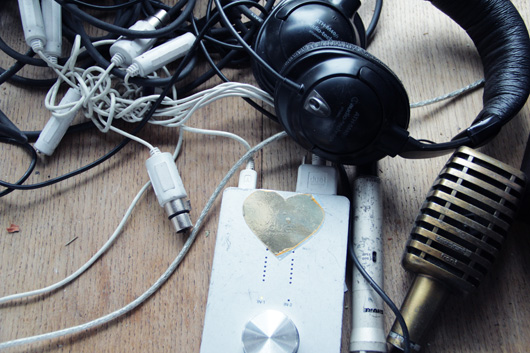
Does Sepalcure have a different sort of production process than Machinedrum?
Not necessarily. We actually approach it very similarly, with the obvious advantage of having another person there. If anything, it’s the fastest project that I have. We are both very strong working within Ableton, and we’re both very strong instrumentalists. Praveen actually has an advantage over me. He has a lot of different analog synths. He has a Rhodes piano. He’s got a lot toys to play around with. It gives us a nice balance. One person is manning the computer while the other person is playing stuff. Then, once one person gets too computered out, we can switch it up. It keeps this really nice flow going.
Are you always in the same room when you’re making Sepalcure stuff?
Yeah, we decided that it has to be that way. It’s really important to us. The Fleur EP was the only time we didn’t do that. Of course we really like those tracks, but when we listen to them, we can hear who had a heavier influence on the track, whereas with our LP, we’ll listen to the songs and forget who did what. I think that feels nicer, more like a collaboration and less like a nerdy file swap.
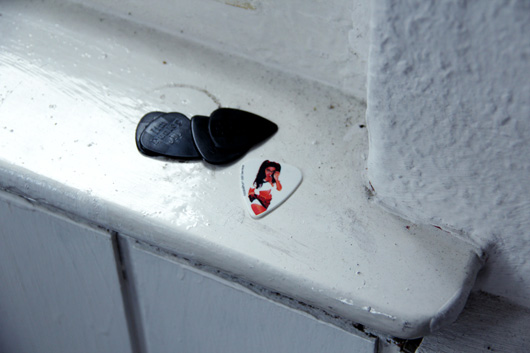
Sepalcure generally has more organic/analog elements than Machinedrum. Is that something you purposefully don’t put into in your own music?
Not necessarily. I think it’s interesting that you’re coming to do this interview now, because I’m finally saving up enough money to build out the kind of studio that I would want. Praveen has been fortunate enough to acquire a lot of these analog bits that have definitely been influential on the sound of Sepalcure. But I still [have] the extensive sample libraries, and [I’m always] really adamant that if I’m at a friend’s studio, and they have a really cool synth that I like, I’ll try to record a bunch [of sounds] from it, as many as possible, so I can use it later. So [Machinedrum] still retains some sort of analog influence. It would still be nice to just have it in the room, of course. So, maybe come back in a year and we’ll see what [the studio looks] like.
